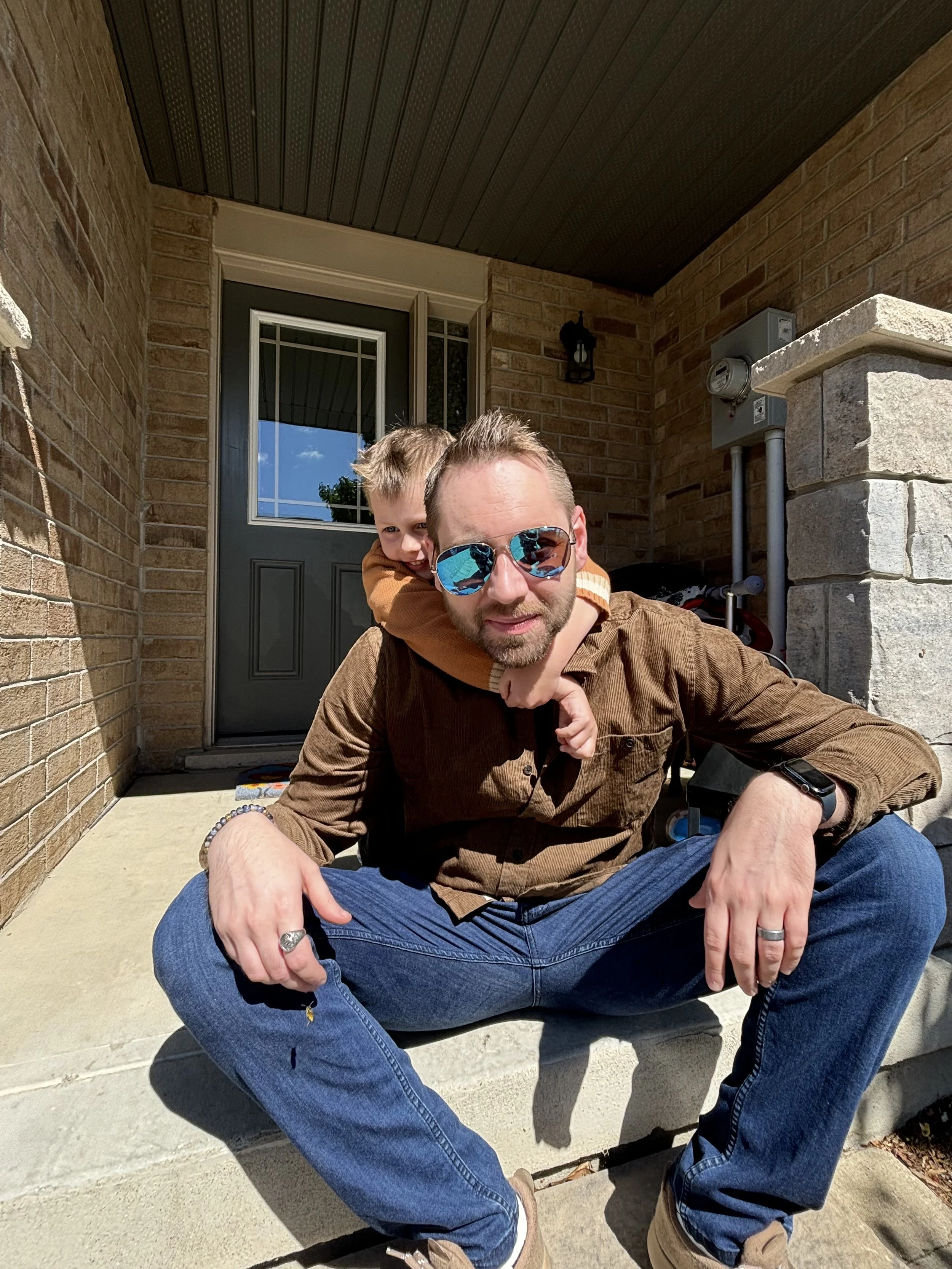Finding My Frequency: A Radio Broadcaster's Journey
The Voice That Never Left
Although I formally left the radio broadcasting industry in 2011, I still receive weekly or daily comments.
"You sound like you should be on the radio."
“Have you ever worked on the radio?"
I usually smile, thank them, and ask why, knowing it has to be more than just the voice.
They usually explain that my tone, cadence, and vocabulary stand out.
It's always surprising and humbling. This happens everywhere, from the Starbucks drive-thru to meetings with stakeholders at Fortune 500 companies. Mind you, they also see my studio microphone, which could give it away.
The Dream Takes Root
I was once a 9-year-old kid telling everyone who would listen that I wanted to be a radio broadcaster someday. It wasn't about attention; it was always about making others smile, laugh, and think. I wanted to be their freedom from concern. Those who knew me often remarked that it would be a destiny fulfilled, even though I don't believe in such a concept.
But beyond my personality, here's what others didn't always see: hard work.
Overcoming Early Challenges
I was energetic, creative, and extremely sociable as a young child. There was just one issue; very few individuals outside of my parents could actually understand me. My energetic and creative personality directly impacted my ability to communicate with the world around me. I spoke far too quickly and had great difficulty keeping up with my ever-changing thought process.
My Grade 1 experience was pivotal. I met with a speech therapist who attempted to get me on the right path regarding basic articulation. As it turns out, this woman was the mother of my Grade 1 teacher, a teacher who constantly wrote me off and put me down, just as she did with any other child who crossed her path. Although our memories tend to be less than accurate at such a young age, I vividly recall something this teacher once told me.
“Stop talking and be quiet. No one can understand you anyway." Harsh? Just a tad!
Finding My Voice
Truth be told, I was never a confident speaker in any situation.
I was more comfortable just playing with action figures or watching television. But even at such a young age, I realized things needed to change drastically. Within 6 months, my communication ability had grown by leaps and bounds. I still had apparent improvements to make, but I was proud of myself.
From then on, I obsessively listened to the radio, watched sports commentators, especially professional wrestling, and studied any public speaker to understand what made them great, often mimicking them. This is likely why I can impersonate many characters and individuals even today.
Education and Early Career
I attended Fanshawe College for Radio Broadcasting, determined to be one of the top students. While I was never scholastically inclined (except in Grades 11 and 12), my passion for broadcasting changed everything.
Following a successful first year, while others took the summer off, I chose to stay at Fanshawe, volunteering to continue hosting shows on 106.9 The X. I didn't see this as sacrificing my time. It was honing my craft.
After graduating as one of the top students in my class, I faced the intimidating question that haunts every new graduate:
“What next?”
Breaking Into the Industry
I took a unique approach to job hunting.
I researched every radio station within a 100-km radius and contacted Program Directors for station tours and advice. These conversations invariably turned into informal interviews. I visited countless stations from London to Stratford to Woodstock, attempting to get my foot in the door.
Eventually, my Aunt Sue, who had worked in Marketing/Advertising for CFPL Radio in London, helped me land an opportunity in Sarnia. This led to an interview with not one but three program directors for the rock, easy listening, and country stations. Despite being grilled by three Program Educators, I passed with flying colours, even fielding detailed music questions about my passion for music. (I wasn't lying!)
The Climb
My radio career began with hosting live overnight shifts from midnight to 5:30 a.m. at K106.3, commuting one hour each way from London without hesitation. The bet paid off. After filling in one morning for a sick morning host, I impressed the Program Director from CHOK with my ability to think on my feet and engage listeners with celebrity impressions.
At 21, I landed a rare opportunity: the Mid-Day Host position at CHOK.
Soon after, I became an Assistant Producer, handling commercials and station promos.
I was also voice-tracking (an industry term for pre-recorded) for K106.3 and 99.9 The Fox, meaning I was on the airwaves seven days a week across three different formats.
So, a typical week resembled the following:
CHOK (Live)
- Monday to Friday: 10:00 AM - 2:00 PM
K106.3 (Pre-recorded)
- Monday to Saturday: 12:00 AM - 5:30 AM
99.9 The Fox (Pre-recorded)
- Sunday: 2:00 PM - 6:00 PM
This opportunity also taught me a valuable lesson in adaptability. I needed to remain authentic while speaking to three separate audiences. Thankfully, I thoroughly enjoyed this challenge.
I never scripted my shows, preferring to go off jot notes, but I was always well prepared with plenty of topics to discuss. You also cannot be afraid to fly without a safety net, so you must be quick on your feet.
With a growing audience, I was promoted to the Afternoon Host position. While maintaining my Assistant Producer role,
I also proposed hosting the Country 103.9 CHOK Countdown Show every Saturday afternoon, which was replayed on Sundays. I figured producing this in-house was far more cost-efficient since we were outsourcing it by purchasing rights to another show. Sure, it was more work, but once again, it offered an opportunity to improve steadily.
For being so young, I surprisingly resonated with a much older demographic. This likely had everything to do with my obsession with show prep, passion for my job, and sense of humour. When interviewing artists, I ensured the environment was welcoming, fun, and conversational. I challenged myself to ask questions that allowed their personality to shine, not the same standard ones they constantly received.
I'm my worst critic, but I was genuinely proud of my work during this time.
One of the highlights of my broadcasting career was my involvement with Rogers Sarnia Bayfest, an annual music festival that ran from 1999 to 2012. Across all shows, the festival attracted upwards of 100,000 visitors per year.
I had the privilege of introducing artists at the 2009 and 2010 country weekends, standing on stage in front of nearly 15,000 people. I felt alive, full of energy, and entirely at home. I'll never forget when one colleague remarked to one of the organizers, “Chris was born for this."
The Peak and Valley
By October 2010, at age 24, I had achieved my childhood dream: becoming a morning radio host.
I had become the youngest permanent morning radio show host at Country 1039 CHOK. This milestone came with mixed emotions: the thrill of reaching such heights so young and the weight of carrying a morning show solo. Having someone to bounce ideas off of, share the spotlight with, and break the pre-dawn silence would have made a world of difference.
Morning radio can be lonely enough with the 4 AM wake-up. Doing it alone sometimes made it feel like performing for an empty theatre, even though thousands were listening.
An Oscar Wilde quote perfectly captures my morning show experience: “There are only two tragedies in life: one is not getting what one wants, and the other is getting it."
As the morning show host, I made less than $30,000 a year, and I was too young and inexperienced to comprehend my situation fully.
While my friends were working, I was off.
I couldn't stay out too late if they wanted to get together in the evenings.
Loneliness led me to adopt my four-legged companion, Timbit. He remains with me today, and we're still best buddies.
I should have sought more mentorship and advice, but when I asked my Program Director for guidance, I was told, "You're too young and don't have kids. You have no real-life experience."
It still perplexes me to recall this conversation; they had promoted me to the position, but I hadn't asked for it.
Looking back, I let that one dismissive response stop me from seeking guidance elsewhere. That's on me. Plenty of industry veterans would have been willing to share their wisdom. I just needed to be brave enough to keep asking.
During this time, it was no secret that I wanted to return home to London, Ontario. An exciting opportunity arose when Blackburn London announced the launch of 98.1 Classic Rock. I became one of the top contenders for the evening show position, which ran from 7 p.m. to midnight.
Sadly, I became the silver medalist when they hired a radio personality from Vancouver instead. Though she didn't last long in the role, the missed opportunity had already derailed my plans to return to my hometown, climb the ranks again, and continue my career there.
The End of an Era
In July 2011, CHOK announced they were “heading in a new creative direction."
It was never explained why they were taking a new direction, but such is life; many other broadcasters have suffered the same fate.
Why I Never Went Back
Though I've worked in other industries, colleagues, customers, and friends occasionally ask me why I never continued my career.
Well, there were a few opportunities to continue in radio, but I chose a different path for three main reasons:
I didn't want to move away from my family and friends again. I was presented with two job opportunities to continue, but it would have placed me 3 or 5 hours away from home. I'm so glad I returned home, as I soon dated my now wife of 11 years and eventually became a father.
Money has never been my primary motivation, but I knew I could earn more in other fields. I increased my salary by 40% the following year, which continued over time, so my gut instinct proved accurate. I could have never achieved my current financial situation if I had remained in radio broadcasting.
I saw the writing on the wall. Satellite radio and podcasting (especially) were primed to disrupt the industry. Talent was grossly underpaid, and I was concerned it would only worsen.
Life After Radio
Do I miss broadcasting? Frequently. After all, it was my first love, and I'm still associated with it.
I used to think I was born for radio, but I was born to help others and alleviate their concerns. This skill translates to many industries.
More importantly, I care most about being the best father I can be to Max.
Thanks to contacts I've made along my journey, I still get my fix through voice-over work, both nationally and globally. I've hosted sponsored podcasts and produced countless videos.
I also continue to utilize the skills I honed in radio in many other roles, including my current role.
The voice never really left; it just found a different frequency.













